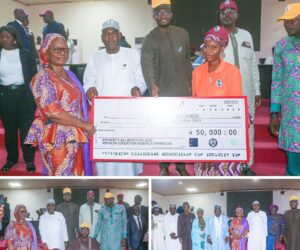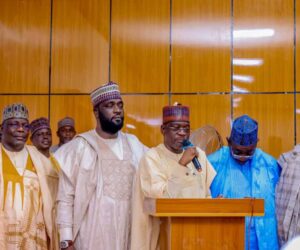As Nigeria charts a course toward industrial transformation and technological self‑reliance, the National Agency for Science and Engineering Infrastructure (NASENI) is emerging as a pivotal intermediary between government ambitions and private-sector innovation.
NASENI’s embrace of public‑private partnerships (PPPs) is redefining how research translates into scalable solutions that address real-world challenges, from agriculture to clean energy and manufacturing infrastructures.
On Tuesday, July 1, 2025, NASENI signaled the commencement of a strategic move to attract Nigerian and foreign partners to ensure the development of Abuja Technology Village (ATV) which has a 300‑hectares land to transform into a manufacturing cluster for technology-driven industries. The site will host facilities dedicated to renewable energy components, electric vehicles, and battery production.
SPONSOR AD
The Abuja Technology Village (ATV) established in 2009, is a pioneering technology park and Special Economic Zone (SEZ) in Nigeria’s capital city, Abuja. Strategically designed to foster innovation and entrepreneurship. ATV provides a unique ecosystem for technology-based businesses to thrive.
Abuja Technology Village’s state-of-the-art infrastructure and conducive environment makes it an attractive hub for local and international companies, research institutions, and innovators. The village is focused on key sectors such as Information and Communication Technology, Biotechnology, Minerals Technology, and Energy Technology. By providing a platform for NASENI’s collaboration, innovation and growth, ATV aims to drive economic development, create jobs, and position Nigeria as a leader in the global technology landscape.
The Executive Vice Chairman and Chief Executive Officer of NASENI, Mr. Khalil Suleiman Halilu, reaffirmed the Agency’s commitment to come with local and foreign partners to transform NASENI’s allotted site at the Abuja Technology Village from a research-centric institution into a fully-fledged manufacturing agency.
“NASENI will work to attract investments and create job opportunities through this initiative. Our goal is to promote national brands and local production through the Abuja Technology Village. This is just the beginning; more factories will rise, and innovation will flourish within the 300 hectares. “we are assuring that ATV will not be disappointed,” said the EVC.
“We will no longer keep our research on the shelf as prototypes. Today, we are making a clear commitment to turn renewable energy and other innovations into real, market-ready products. This partnership with ATV is a key step in that direction,” he added.
Halilu stressed that last year alone, NASENI developed 35 market-viable products, and that the collaboration with ATV will help scale those innovations. He emphasized the mutual benefits of the partnership, citing shared goals such as strategic location, investment incentives, and a joint vision for technological advancement of Nigeria and the economy.
Among these 35 products are solar-powered tricycles, modular rice mills, drone prototypes, and lithium battery components, many of which are being targeted for commercialisation under NASENI’s new investment ecosystem. Abuja Technology Village officials echoed this urgency, describing the partnership as timely and vital to Nigeria’s pursuit of import substitution, job creation, and economic regeneration.
The Acting Managing Director, Abuja Technology Village Free Zone Company, Mr. Isa Yusuf Shafeek, praised the collaboration, calling it timely and vital for Nigeria’s industrial development. “This partnership is a perfect fit, especially when Nigeria urgently needs to build local production capacity. ATV is ready and committed to working with NASENI on various technology-driven projects,” he said.
Also, Dr. Dahiru Mohammed, Special Adviser on Foreign Partners & Inter-Governmental Affairs to NASENI EVC, emphasized the importance of the initiative for Nigeria’s human capital development. He noted that establishing factories and attracting tech companies has been a top priority for the new NASENI’s leadership.
“We may even require more space beyond 300 hectares soon due to the high level of interests this partnership is already generating,” Dr. Mohammed said. “This collaboration is a bold step toward reducing our dependence on imports and fostering domestic innovation” he added noting that the NASENI-ATV partnership marks a significant milestone in Nigeria’s push for industrialization and technology based economic transformation.
Similarly, in Bauchi State, the “Irrigate Nigeria” initiative, launched in March 2025 under a PPP model, seeks to unlock the nation’s vast arable land by deploying solar‑powered, automated irrigation systems across smallholder clusters. This initiative replaces past reliance on erratic rainfall with a transparent model that emphasizes private investment, technical support, and farmers’ active repayment through harvests.
The scheme is designed to stabilize commodity prices and boost commercial farming, recently inaugurated in Udubo, Gamawa LGA, where over 30,000 hectares are expected to be cultivated annually. Central to its success is collaboration between NASENI providing technological infrastructure, the Renewed Hope Infrastructure Development Fund (RHIDF), financing public components, and private investors supplying expertise and management.
This partnership transcends food security; it nurtures agricultural resilience, empowers women and youth, and fosters a shift away from subsistence farming. NASENI’s Executive Vice Chairman, Khalil Suleiman Halilu, emphasized that the initiative is built not just on irrigation technology but also on improved seeds, fertilizer supply, water management training, and agribusiness coaching.
It is structured to expand across Nigeria’s irrigation potential of 3.14 million hectares, of which only a fraction currently benefits from modern systems. While agriculture showcases NASENI’s PPP model in action, energy and manufacturing sectors are also benefiting.
In May 2024, NASENI made its first equity investment in the clean‑energy firm Powerstove, scaling its production from 100,000 to over one million cookstoves annually. This milestone not only addresses clean cooking adoption in Nigeria but also enables access to carbon‑credit revenue, positioning NASENI as both investor and technological mentor. Halilu emphasized that scaling this locally driven enterprise advances environmental sustainability while embedding economic value through carbon credit markets.
Similarly, in March 2025 NASENI announced a partnership with Adeayworld Energy and China’s Zhejiang Sinray Electronics to locally manufacture and distribute certified compressed natural gas (CNG) kits. Under the Presidential Initiative on Compressed Natural Gas (PiCNG), this collaboration aligns with ISO standards and seeks to reduce reliance on petrol and diesel, drive fuel efficiency, and lower greenhouse gas emissions.
Prince Adeleke, CEO of Adeayworld Energy, stated its potential to bolster energy security and economic diversification by creating local jobs and lowering living costs. Halilu confirmed NASENI’s commitment to scaling CNG adoption through locally manufactured conversion kits.
President Bola Tinubu underscored the importance of the CNG initiative by inaugurating the NASENI CNG Centre in Abuja, located in Utako, in June 2024. The facility, established in partnership with Portland Gas Limited and Kia, is capable of converting 15 vehicles every two hours, equivalent to approximately 2,700 conversions per month. The launch was a public demonstration of Nigeria’s readiness to embrace alternative energy options, gas conversion and electric vehicles and was delivered with evident government backing.
To bolster grassroots innovation and retain technical talent, NASENI partnered with AfriLabs in May 2024 to establish the NASENI Innovation Hub in Abuja, designed to incubate startups and attract diaspora professionals through programmes such as Reverse Japa, DeltHer, and NASENI Xceler8.
The AfriLabs-NASENI Innovation Hub in Abuja is preparing to incubate multiple cohorts focused on reverse Japa to attract diaspora talent, women-led engineering ventures under the DELT-Her programme, youth teams via FutureMakers, and tech start-ups via NASENI Xceler8.
In a further push to energize local industry, NASENI in May 2025 partnered with the Niger Delta Power Holding Company (NDPHC) and Haier Technologies to deliver a 20-megawatt embedded solar power plant at Challawa Industrial Area in Kano. The plant aims to power factories in the zone and reduce dependence on grid supply.
Across agriculture, energy, and manufacturing, a common thread underpins NASENI’s PPP strategy of translating science into commerce. It bridges the gap between innovation and industrialisation, offering incubation, capacity building, and commercialization pipelines for technologies previously dormant on shelves . This integrated model stands in stark contrast to legacy systems that falter due to bureaucracy and poor funding flows.
NASENI’s roadmap includes expanding the Irrigate Nigeria scheme across multiple agro-ecological zones, targeting transformational coverage on millions of hectares. The agency plans a 100 MW solar-industrial park linked to ATV for electric vehicle and battery component manufacture. Simultaneously, the CNG kit initiative aims to decentralize conversion centres nationwide.
This pipeline demonstrates a deliberate move from project launch to scalable industry. Yet, the sustainability of these PPPs depends upon consistent policy environments, resilient financing, and robust contract governance.
President Tinubu, recognizing NASENI’s role as a national innovation driver, directed all ministries, departments and agencies (MDAs) to patronise NASENI-developed products. This directive, issued in 2024, is meant to eliminate reliance on imported technologies and to institutionalize the agency’s market-ready solutions in government procurement pipelines.
The Irrigate Nigeria platform realizes not only year-round farming but agricultural resilience, nutritional stability, and rural upliftment. The Powerstove investment couples environmental responsibility with economic opportunity. CNG kit local production reduces fossil fuel dependency while reducing costs. The ATV industrial zone translates innovation into output, creating jobs and moving Nigeria up the value chain.
Public‑private partnerships can be transformative, if built on trust, transparency and shared risk. NASENI’s evolving blueprint signals a deliberate effort to recharge Nigeria’s innovation ecosystem and to deliver real products and services that improve lives, create jobs, and build a competitive economy. If these PPPs continue to evolve from frameworks into fully operational value chains, Nigeria may finally unlock the promise of its homegrown scientific potentials.








